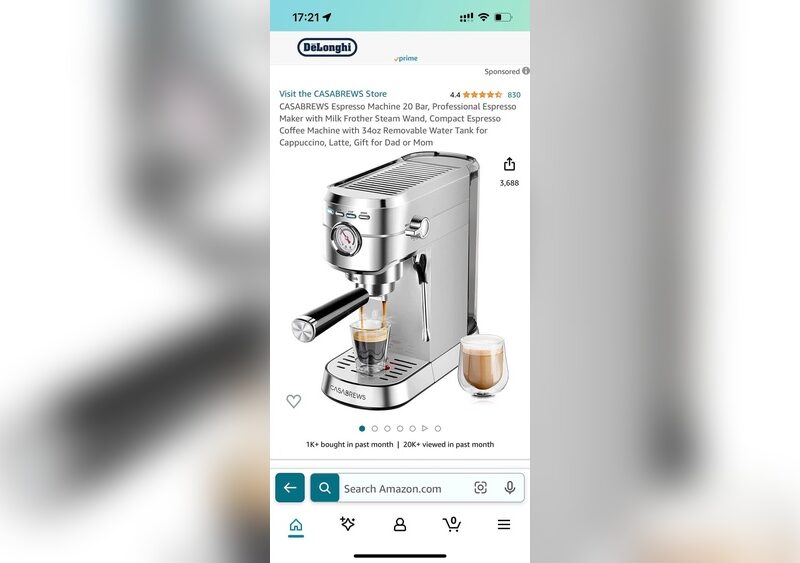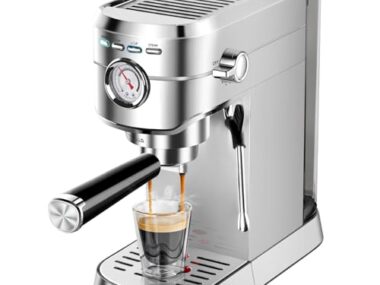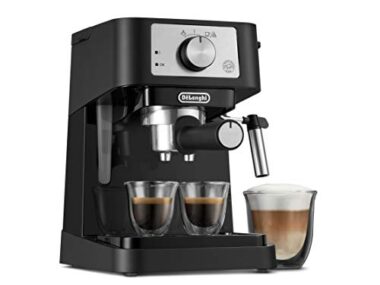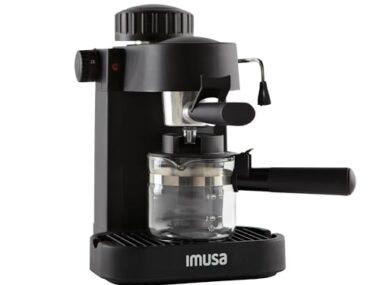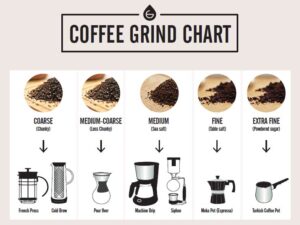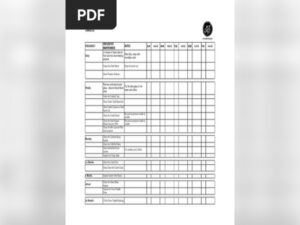If you’re serious about making great espresso at home, you might think the espresso machine is the star of the show. But here’s a little secret: your grinder actually plays an even bigger role in crafting that perfect cup.
Why? Because the quality and consistency of your grind directly affect the flavor, extraction, and overall experience of your espresso. Without a good grinder, even the most expensive espresso machine can’t deliver the rich, balanced shot you crave. Ready to discover why investing in the right grinder could transform your coffee routine?
Keep reading—this might just change the way you think about your morning brew forever.
Grinder Vs Espresso Machine
Choosing between a grinder and an espresso machine can be confusing for coffee lovers. Both tools play key roles in making espresso. Yet, the grinder often has a bigger impact on the final coffee taste. Understanding how each affects the brewing process helps explain why.
Role In Coffee Quality
The grinder controls the size and consistency of coffee grounds. Uniform grounds allow even water flow through the coffee. This consistency helps extract the right flavors. An espresso machine relies on these grounds to work properly. Without good grounds, even the best machine can’t brew a great shot.
Espresso machines control water temperature and pressure. They brew the coffee using these factors. But the flavor quality starts with the grind. The grinder affects freshness by grinding beans just before brewing. This freshness is crucial for rich aroma and taste.
Impact On Flavor Extraction
Flavor extraction depends on grind size and uniformity. Too coarse grounds cause weak, under-extracted coffee. Too fine grounds lead to bitter, over-extracted shots. A precise grinder adjusts grind size to match brewing needs. It balances extraction for smooth, flavorful espresso.
Espresso machines extract flavor by forcing hot water through coffee. If the grounds are uneven, extraction becomes uneven too. This results in sour or bitter notes. A good grinder avoids this by producing consistent particles. This consistency ensures balanced flavor extraction every time.
Why Grinder Matters More
The grinder plays a vital role in crafting a perfect espresso. It shapes the coffee’s flavor and quality more than the machine itself. A good grinder ensures the coffee grounds are fresh, uniform, and suited to your brewing style. This section explains why the grinder matters more than the espresso machine.
Freshness And Aroma
Grinding coffee just before brewing keeps it fresh. Coffee beans start losing flavor once ground. The grinder locks in the rich aroma and taste. Freshly ground coffee releases oils that create a better flavor. Without fresh grounds, the espresso tastes flat and dull.
Consistency In Grind Size
Consistent grind size helps extract flavors evenly. Uneven grounds cause weak or bitter espresso. A quality grinder produces uniform particles. This balance ensures the water flows correctly. Consistency leads to a smooth, rich espresso shot every time.
Control Over Brewing Variables
The grinder allows control over grind size and texture. Different espresso styles need different grind levels. Adjusting the grinder changes the coffee’s strength and flavor. It helps tailor the espresso to personal taste. This control is crucial for brewing precision.
Types Of Coffee Grinders
Choosing the right coffee grinder is essential for brewing excellent coffee at home. Different grinders offer varied results. Understanding their types helps you pick the best one for your needs. Quality grinding controls flavor and freshness more than the espresso machine itself.
Burr Grinders Explained
Burr grinders crush coffee beans between two abrasive surfaces. This method produces uniform coffee grounds. Consistency in grind size improves coffee extraction and taste. Burr grinders come in flat and conical styles. Both provide better control over grind size than blade grinders. They allow adjustments from coarse to very fine grinds. This flexibility suits all brewing methods, including espresso. Burr grinders also generate less heat, preserving coffee flavor.
Blade Grinders Limitations
Blade grinders use spinning blades to chop beans unevenly. This causes inconsistent grind sizes with coarse and fine particles mixed. Inconsistent grounds lead to uneven extraction and bitter or weak coffee. Blade grinders heat up beans during grinding, affecting taste. They offer little control over grind size. Blade grinders are cheaper but less reliable for espresso. They work better for drip coffee but still fall short of burr grinders. Overall, blade grinders limit the quality of your coffee experience.

Credit: www.reddit.com
Features Of A Good Grinder
A good grinder plays a key role in making great espresso. It controls the size and consistency of coffee grounds. These factors affect the flavor and texture of the coffee. Choosing a grinder with the right features helps you get the best from your beans. Below are important features that define a good grinder.
Fine And Uniform Grinding
Grind size must be fine and even for espresso. Uneven grounds cause weak or bitter coffee. A good grinder delivers uniform particles every time. This consistency helps water flow evenly through the coffee. It extracts the right flavors and oils for a rich taste.
Micro-adjustments For Precision
Precision matters in espresso brewing. Small changes in grind size make a big difference. A good grinder allows micro-adjustments to dial in the perfect grind. This control helps match the grind to your espresso machine and beans. It supports consistent shots with balanced flavor.
Low Retention And Waste Reduction
Grinders should hold very little ground coffee inside. Low retention prevents old grounds from mixing with fresh ones. It also reduces waste by delivering only what you need. This keeps your coffee fresh and saves money over time.
Espresso Machine Requirements
Espresso machines need precise conditions to make a good shot of espresso. They depend on stable pressure and temperature. These two factors help extract flavors from coffee grounds correctly. Without them, the espresso tastes weak or bitter.
Besides machine settings, the quality of coffee grounds plays a key role. The grind size must be just right for the machine to work well. This is why the grinder matters so much for espresso.
Pressure And Temperature Control
Espresso machines push hot water through coffee under high pressure. The ideal pressure is around 9 bars. The water temperature should be near 90 to 96 degrees Celsius. These settings create the right environment for extraction.
If pressure or temperature varies, the espresso shot will be uneven. Machines with poor control cannot fix issues caused by bad coffee grounds. Even the best machine fails with inconsistent grinds.
Importance Of Grind Quality
Espresso requires a very fine and even grind size. Burr grinders produce this by crushing beans uniformly. Blade grinders cannot achieve this consistency. Uneven grounds cause water to flow too fast or too slow.
Good grind quality ensures proper resistance against water pressure. This balances extraction time and flavor release. A good grinder can improve espresso more than upgrading the machine itself.

Credit: www.bonappetit.com
Budget Allocation Tips
Budget allocation plays a key role in setting up your coffee station. Prioritizing funds can improve the quality of your espresso. Spending wisely helps you enjoy better coffee every day. Focus on where your money makes the biggest difference.
Investing More In Grinder
The grinder controls coffee flavor and freshness. A good grinder produces uniform grounds for better extraction. It preserves aroma by grinding just before brewing. Spend more on a burr grinder with consistent settings. This investment impacts taste more than a fancy espresso machine. Precision and control start with the grinder.
Choosing An Affordable Espresso Machine
Espresso machines vary greatly in price and features. Choose a simple, reliable machine to save money. Basic models still brew excellent espresso with the right grind. Avoid costly machines with unnecessary functions. Focus on stable temperature and pressure control. This balance allows quality espresso without overspending.
Common Grinding Mistakes
Grinding coffee beans correctly is essential for making great espresso. Many beginners make mistakes that affect the taste and quality of their coffee. Understanding these common grinding errors helps you improve your espresso experience. The grinder’s role is often more important than the espresso machine itself. It controls how the coffee extracts and flavors develop.
Using Blade Grinders For Espresso
Blade grinders chop coffee unevenly. They produce a mix of coarse and fine particles. This inconsistency causes uneven extraction in the espresso shot. Some parts over-extract and taste bitter. Others under-extract and taste sour. Burr grinders crush beans evenly, giving a consistent grind size. This consistency is key for rich, balanced espresso flavors.
Ignoring Grind Consistency
Consistent grind size is critical for espresso quality. Large variations in grind size cause uneven water flow through the coffee. This leads to poor extraction and weak flavor. Many people do not check or adjust their grind settings regularly. Failing to maintain grind consistency results in bitter or watery espresso. Adjusting the grinder and testing shots often improves taste greatly.
Enhancing Coffee Experience
Enhancing the coffee experience depends heavily on the quality of the grind. Freshly ground coffee unlocks rich flavors and aromas that pre-ground coffee cannot match. The grinder controls the size and consistency of the coffee particles. This directly affects how water extracts flavors during brewing.
Choosing the right grind setting allows you to find the perfect balance for your taste. This flexibility makes the grinder more critical than the espresso machine itself. A good grinder helps you explore new coffee profiles by adjusting the grind size to suit different beans and methods.
Experimenting With Grind Settings
Adjusting grind settings changes the taste and strength of your coffee. Finer grinds produce stronger, more intense flavors. Coarser grinds create lighter, milder brews. Small changes in grind size can make a big difference in taste. This lets you customize your coffee to match your mood or the time of day.
Experimenting with settings helps you discover the best extraction for each bean. It improves consistency and reduces bitterness or sourness. This control over grind size is not possible with pre-ground coffee or blade grinders.
Pairing Grinder With Machine
Matching your grinder with your espresso machine enhances performance. A high-quality burr grinder produces uniform grounds needed for the machine to work well. Inconsistent grinds cause uneven extraction and weak shots.
The grinder’s precision complements the espresso machine’s pressure and temperature controls. This partnership creates balanced, flavorful espresso with smooth crema. Investing in a good grinder ensures the machine can perform at its best.

Credit: www.atcoffee.co.uk
Frequently Asked Questions
What’s More Important, An Espresso Machine Or A Grinder?
A grinder is more important because it controls grind size and freshness, essential for a quality espresso shot. Espresso machines rely on consistent, fine grounds to extract flavor properly. Without a good grinder, even the best espresso machine cannot produce great coffee.
What Is The Importance Of Grinders?
Grinders ensure consistent, precise particle size for better flavor extraction. They maintain freshness and improve coffee quality. Grinders reduce tool wear and save replacement costs. Proper grinding enhances brewing efficiency and taste. Investing in a good grinder elevates your coffee experience significantly.
What Are The Benefits Of A Coffee Grinder?
A coffee grinder ensures fresher coffee by grinding beans just before brewing. It offers control over grind size, enhancing flavor and aroma. Consistent grinding improves extraction and taste. Using a grinder saves money by avoiding pre-ground coffee. It customizes coffee strength and brewing methods effectively.
Do I Need A Grinder For My Espresso Machine?
Yes, a burr grinder is essential for espresso machines. It delivers a fine, consistent grind needed for optimal extraction and rich flavor. Avoid blade grinders, as they produce uneven grounds that harm espresso quality. A quality grinder ensures better taste and proper machine performance.
Conclusion
A good grinder shapes the flavor and freshness of coffee. Espresso machines rely on finely ground beans to work well. Without a consistent grind, espresso can taste bitter or weak. Grinding controls the coffee’s texture and extraction quality. Investing in a quality grinder improves every cup you make.
The machine’s role is important but depends on the grind. Coffee lovers should focus on grinding for the best taste. Small changes in grind size bring big differences in flavor. A grinder truly sets the foundation for great espresso.
